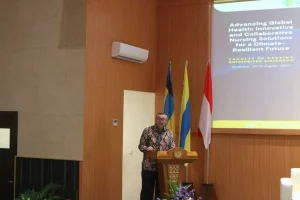Stunting is a physical developmental abnormality that is measured based on height according to age and caused by chronic nutrient deficiencies, so the child becomes shorter than his/her age. Indonesia is ranked 5th in the world for the number of children with stunting, where more than one-third of children under five years have height below average. Limited stunting prevention will lead to short-term impact, increasing mortality and morbidity and decreasing learning achievement, capacity, and work productivity.
Stunting occurs due to chronic malnutrition in the first 1000 days of life and results in disrupted child development. The golden period of the first 1000 days of life is needed to fulfill children’s nutrition so that children can develop optimally and children’s brain development occurs rapidly. Stunting will reduce their chances of survival and also hinder the child’s optimal health, growth, and development leading to long-term harmful consequences for cognitive abilities, school performance, and the child’s future. Stunting can make the quality of human resources, which are assets and investments of the advanced nation, hampered, and the productivity and competitiveness of the nation will also decline.
According to Nolla J Pender, previous behavior in the past had an impact on behavior that could improve health status. A community that strongly adheres to cultural customs can influence their health status. Madurese inhabits Madura Island and it is one of the ethnic tribes with a large population in Indonesia. Madurese are very cultural; they prioritize the religion and culture of the ancestors, so sometimes they ignore the health behavior taught by health workers. Madurese people believe in their ancestors’ beliefs, so they tend to under-utilize existing health services provided in the communities, such as health education. It causes pregnant women not to get maximum services from the public health center, such as not getting iron tablets, folic acid, iodine, and complete immunization essential for stunting prevention during pregnancy.The Madurese prohibit pregnant women from consuming foods that are considered taboo, such as squid, shrimp, and poultry, even though the foods are useful for the growth and development of the fetus. They believe the baby will resemble the animal eaten by their mother when the baby is born. This taboo behavior will contribute to the nutritional adequacy of both micronutrients and macronutrients. Pregnant women in the Madurese tribe who do not get maximum health services from the Puskesmas or do not consume high-protein foods which are considered taboo cause pregnant women to have a risk of having stunting children. Therefore, to create intelligent, healthy, excellent, and highly competitive generations, stunting preventive behavior is a priority.
Author: Dr. Esti Yunitasari, S.Kp., M.Kes
Journal: Mother’s Eating Behavior During Pregnancy and Family Income with Malnutrition: Stunting Prevention in Madura, Indonesia (Mother’s Eating and family Income with Stunting Prevention)









